- Home
- J. D. Rhoades
Ice Chest Page 3
Ice Chest Read online
Page 3
“He…” Mario began, but Chirelli held up a hand and he fell silent. When Paul Chirelli spoke, people listened. It was often the last sound people heard.
“I know,” he said. “Aldo fucked up. When you said ‘send it to everybody,’ he shouldna sent it to your girlfriend, I get that. Everybody was drunk, high, whatever, but yeah, he shoulda known better’n to send that picture to everybody on your contact list. Like your dad, for example. Of course, you shoulda known better, too, than to ask that meatball to do somethin’ that required him to think, drunk or sober, but…” He shrugged. “Here’s the thing, though, kid. She’s a piece of ass. A man—a leader of men—doesn’t lose his shit like that over a piece of ass. She’s not even Italian.”
“I love her, Paul,” Mario said. His voice broke. “She’s more than a piece of ass. She’s my life.”
Chirelli shook his head. “Jesus, it’s a good thing I got here before you started blubberin’ like this in front of people. People who might take the word back to your old man that you’re cryin’ like a little bitch over some cooze.” Mario’s face reddened and he looked as if he was about to say something, but Chirelli just raised a warning finger and cocked his head and Mario fell silent again.
“I like you, kid,” Chirelli said. “Always have. And I want to see you succeed, just like your old man does.”
“Is that why he sent you down here to babysit me?” The sulky tone was back.
“To advise you, Mario,” Chirelli said. “Another thing a leader of men knows how to do is take advice from those with experience. You know the first thing they tell a young officer when he gets outta West Point?”
“What?” It was clear that Mario didn’t understand the question, but Chirelli took it as an invitation to proceed.
“They tell him to listen to his sergeant. The old veterans. Maybe he outranks ’em but they know what to do when the bullets start flyin’.”
“So, you’re like, what, my sergeant?”
“Close enough.”
“When were you in the army?”
“I seen Platoon about sixty times. Now listen up. You got to punish the Moose, I get that. But no more rough stuff. Roberto may be your pop’s best friend and his consigliere, but if he finds out you been slappin’ his kid around, there’s gonna be problems. An’ we don’t need that right now, hear me?”
“Why, what’s going on?”
“Nothin’ you need to worry yourself about,” Chirelli said. “Now, what I suggest we do about the Moose is that you give him some shit job to do. Somethin’ that lets him know he’s out of favor, but somethin’ if he does right, he can get back in the circle.”
“Like what?”
Chirelli scratched his jaw thoughtfully. “You told me you want someone to keep an eye on your bitch, right? So get Aldo to do it. Does she know him?”
“Aldo? I think they may have met once or twice. But I kind of keep her away from our thing here.”
Chirelli nodded. “See, that’s why I think you got potential. That’s smart. That’s old school. A lot more guys had done that, there’d be a lot fewer guys locked up. So she knows him, and she’ll know she’s bein’ watched. So much the better. It’ll keep her in line.”
“Okay,” Mario said, “but there’s one thing I see wrong with this plan.”
“I’m listening.”
“I send Aldo off to watch a bunch of beautiful girls struttin’ around in underwear. How is that a punishment?”
“I see your point,” Chirelli said. Then he snapped his fingers. “You make him pay his own way.”
Mario nodded. “Okay. That might work.”
“Of course it will work. One thing, though. The Moose turns up anything, any kind of hanky-panky with your lady friend, he reports to you. That’s all, though. I don’t think he’s ready for any kind of, you know, heavy work.”
“Don’t worry,” Mario said, his face grim. “I’ll take care of that part myself.”
Chirelli walked to the door and yanked it open. “MOOSE!” he yelled. “Get your ass back in here!”
THEY MET in a Waffle House a few blocks laterally and quite a few social strata vertically from the hotel. Uncle Rafe waved to Branson through the window from inside as Branson walked up the cracked concrete walkway to the front door.
The interior of the place smelled of fried onions with a sharp overtone of cheap bleach. Rafe got up as Branson approached the booth. He gave his nephew an awkward man-hug, shoulder to shoulder, both lower bodies held stiffly away. Branson slid into the booth, looking warily at the man who’d stayed seated, watching the family reunion as he placidly chewed a mouthful of hash browns. The man was dark-complexioned, with slicked back black hair, long sideburns, and the gaunt look of a cartoon gravedigger.
“This here’s L.B.,” Uncle Rafe said.
The man put his fork down, dabbed at the corner of his mouth with his napkin before extending a hand. “Pleased to meet you, young man,” he said, in a voice that said he hadn’t made up his mind about the truth of that statement.
“Sir,” Branson said, in a voice that let the other man know the feeling was mutual. He took the offered hand and gave it a quick, firm shake before releasing it.
“We went ahead and ordered,” Uncle Rafe said, although there was no food in front of him, just a cup of coffee. He seemed nervous, ill at ease. Branson thought he might be a little afraid of the man he’d introduced as L.B. “You want anything?”
Branson looked at L.B.’s plate, piled high with scrambled eggs and hash browns, with a smaller plate of half-eaten bacon and an untouched but syrup-logged waffle.
“Just coffee,” he said.
Rafe nodded and raised his hand to a skinny young waitress who was bustling by without looking at them, full plates clutched in either hand and balanced precariously on each forearm. “Another coffee here, darlin’,” he said. She acknowledged his hail with a surly nod, without speaking.
“So,” Rafe said, “how you likin’ life in the big city?”
“It’s okay,” Branson said.
“Everything you thought it would be?” L.B. asked him. He’d started on his waffle. The sweet, toasty smell of it had been making Branson regret just ordering coffee, but the smear of syrup on the older man’s chin was enough to suppress his appetite all over again.
“It’s okay,” Branson said again.
“Gets expensive, though,” Uncle Rafe said, “don’t it?”
Branson shrugged. “A little.” In fact, he’d been stunned by how much everything cost: the apartment he’d found through a Craigslist “roommate wanted” ad and that he shared with two hardcore stoners; food; gas; clothing. He’d been living on Kraft Dinner and Top Ramen, scrounging every penny. He’d been putting off getting his rusty old Chevy Malibu inspected because he knew his tires were bald and he could no more afford new ones than he could enter the old wreck in the Indy 500. It was just as well he’d blown things with Stephanie. He couldn’t even afford to take her to a place like this, let alone any place date-worthy. The thought made him sad and angry at the same time. So when the waitress plunked the coffee down in front of him so hard it sloshed and his uncle asked, “Sure you don’t want anything, Bran? I’m buyin’,” Bran pointed at the repast spread out in front of L.B. and said, “I’ll have what he’s having.”
The waitress sighed and looked beseechingly toward the sky beyond the drop ceiling as if the request was the final indignity under which she’d finally crumple, but L.B. nodded as if Branson had reached some sort of milestone. The gesture almost made Branson cancel the order, but he was afraid that might drive the waitress to throw herself on the griddle in despair, so he let it go.
“I’m thinkin’,” L.B. said as he nibbled at a strip of bacon, “that a young fella like you might have ambitions other than bein’ a waiter.” He leaned forward, his eyes bright, his breath redolent of bacon and ketchup. “How’d you like a shot at some real money?”
Branson looked from one man to the other without answering. T
here was a voice of good sense inside him, a better angel of his nature that was running back and forth, ringing every alarm, screaming at him to get up, leave the restaurant, and flee as far and as fast as he could from these two. But Branson had also been raised to be polite to his elders, and especially to older members of the family, and Uncle Rafe qualified. To a Southern boy “raised right,” good manners all too often triumph good sense. People like Rafe Valentine took full advantage of that.
“What kind of money?” he asked.
L.B. smiled. “Depends on how many ways we got to split it,” he said, “but I’m figgerin’ your cut to be somewhere between three quarters of a million and a million dollars.”
The angel in Branson’s head fell silent as if it had been blackjacked. He thought of what he could do with that kind of money. An apartment all to himself. No, an apartment with Stephanie. No, to hell with an apartment; a house. A big one. With Stephanie. And a car. A convertible. American, of course, but a convertible. And no worries about paying the bills. Ever.
The angel began to wake up, its faint, groggy voice barely registering in the back of Branson’s mind at first, but finally seeping through to his front brain. There’s no way to come by that kind of money honestly, the voice said, not that quick. Not without hurting someone.
L.B. seemed to read the doubt in Branson’s eyes. “Don’t worry, kid,” he said, “you’re not gonna be involved in anything dangerous, or anything where anyone might get hurt.”
“The item involved is comprehensively insured, nephew,” Uncle Rafe said. “By one of the largest, richest companies in the world. They’ll not even feel a pinprick from havin’ to pay off. It’ll be no more to them than the bite of the humble mosquito.”
“And all you have to do,” L.B. said, “is to look around that hotel where you work, after hours like, and tell us about the layout. And tell us about what kind of security they’re layin’ down for the Enigma show.”
“Enigma?” Branson said, a line appearing between his eyebrows. “The lingerie people? Y’all are gonna be stealin’ lingerie?”
The waitress had been passing by. She slowed, scowled in a way that looked totally of place on such a young face, then sighed again and moved on like an unhappy spirit.
“Not exactly,” Rafe said, “but we can discuss the details later. Right now, are you interested?”
The angel inside tried to speak up, but the thought of all that money clubbed it silent again.
“Yeah,” Branson said, “I’m interested.”
CHUNK PUT the iPad down and rubbed his eyes. He knew it was more efficient to read his files on the tablet. It saved paper, was better for the environment, blah blah blah. And if he had to pile all the dossiers he needed to get through on his borrowed desk, it would be a nightmare. He still missed having an actual paper file to pick up and read. This didn’t feel like policing. It felt like a video game. A really boring one. Dossier Tycoon 2.0.
He’d been through dozens of files, assembled by the staff he’d picked out himself. Paragon had let him know he had carte blanche in picking his team and a fat, if not completely unlimited, budget. He was too experienced a cop not to use every bit of both. Other team leaders had screamed bloody murder when he grabbed up all the company’s best operatives for himself, but the suits said that, given the job’s high profile, it had to be the company’s number one priority. Chunk hadn’t made many friends as a result, but he didn’t give a damn. He knew if anything bad happened to Enigma’s people or property, it would happen in the full glare of the spotlight and under the pitiless glass eyes of hundreds of cameras, and afterward Chunk McNeill would be lucky to get a job as a night watchman guarding a sewer project in Newark.
He sighed, popped another Tums from the half-filled bowl he’d put on his desk, and picked the iPad back up. It was amazing what a skilled investigator could turn up with a name and social security number and there was a veritable smorgasbord of human peccadilloes spread throughout the investigator’s files on the people working the Birds of Paradise show. Dozens of minor drug busts (followed by repeated trips to rehab, then more busts), drunk driving arrests (ditto), messy divorces, civil lawsuits—there were more red flags in these files than at a May Day rally in Beijing. He’d soon found out that if he used the usual criteria of weeding out everyone with any kind of blot on their record, Enigma would end up with no one to run the show.
Suddenly Chunk straightened up in his chair. He frowned, paged back and forth through the file on his screen with his finger, then picked up the phone and punched a button. “Piper,” he said. “Get in here.”
In a few moments, the door swung open and Zoe Piper sauntered in. She was a slender young woman with straight ginger hair parted in the middle and falling to her shoulders. She was twenty-six, but she looked no older than fifteen, a fact which had come in handy on a couple of undercover assignments. Her major talent, however, was in using computers to gather intel. She took the seat opposite Chunk. She was chewing bubblegum, which always made her seem that much younger.
“Don’t tell me,” she said. “Cartwright.”
“Yeah,” Chunk said. “You sure about this? This isn’t just something you got off some website?”
She looked offended. “Yeah, I got it off some website. But then I ran it down. Multiple sources, multiple sightings, multiple places.” She blew a bubble, let it pop.
“I might have a little more confidence if you’d quit doing that,” Chunk said.
“Doing what?” Piper said.
“Never mind.” He rubbed his eyes again. “I’m going to have to tell Gane. You sure you stand behind this?”
“Chunk,” she said. “Why did you pick me for this job?”
He sighed. “Because you’re really, really good.”
“Exactly. You want me to come with?” There was a tension in her face that showed she was reluctant to make the offer.
“No,” he said.
She relaxed slightly. “Good.”
“Why do you say that?”
She cracked her gum. “I’ll go if you want me to, but I’m not crazy about the way that guy looks at me.”
Chunk stood up. “What? How?”
“You know. He’s always undressing me with his eyes.”
“Gane? I thought Gane was gay.”
She looked at him pityingly. “He’s got a wife and five kids. I thought you were some hot-shot detective.”
“I’m beginning to wonder,” he muttered.
“IMPOSSIBLE,” GANE said. “She’s the star. She’s in all the promos. We spent millions on the TV ads alone, and that’s just the production, not the ad buys. They all feature her.”
“She’s also romantically involved with Mario Allegretti,” Chunk said.
“I know,” Gane said. “He’s come to a couple of our parties.” He shrugged. “Seemed a nice enough young man. Polite.”
“Did you also know he’s the son of Silvio Allegretti?”
“The ‘mob boss’?” Gane made air quotes with his fingers. “I suppose I do. But Mario’s not his father.”
“He’s involved in the business. Drug dealing, gambling.” He looked significantly at Gane. “Armed robbery.”
“And you know this how, Mr. McNeill? Has he been convicted of anything? Is he under investigation?”
“It’s just something…” Chunk stopped, frustrated. “It’s just something every cop in Jersey and New York knows.”
Gane shook his head. “I’m going to need more than that, Mr. McNeill. Besides, Hermione says they’re no longer seeing each other.”
“Hermione Starr?” Chunk said.
“Yes. She overheard a rather heated argument between the two of them when Clarissa was on the plane. She seemed pretty definite that it was over.”
Chunk ran his hand over his hair in frustration. “I still don’t like it. Besides, you said you wanted ‘absolute security.’” He managed to keep himself from imitating Gane’s prissy way of saying it.
“That was be
fore you started telling me I needed to fire everyone that works for me!” Gane snapped. He took a deep breath. “Do this. Look into it further. Talk to Clarissa when she gets here. If you can bring me something concrete, we’ll take what steps we need to take. But until then, I’m afraid I’m going to need more than just one of those”—he made the air quotes again—“‘cop hunches’ like in the movies.”
When this job is over, Chunk thought, I swear I am going to punch the lights out of the next person who does those air quotes at me.
BRAN TURNED the handle on the big door slowly, cautiously, as if he half-expected it to be booby-trapped. He looked up and down the corridor to see if he was being observed. One of the housekeepers was running a vacuum cleaner up and down in front of one of the smaller meeting rooms, but otherwise, this section of the hotel was deserted. He pulled the door to the Grand Ballroom open and slipped inside.
Inside, the lighting was dim, the only illumination cast by a few lights in fake sconces on the wall. The ballroom was huge, with a high ceiling from which dangled a half dozen chandeliers, now dark. A stage had been erected at one end, with a long runway extending out from it, poking out into the room like a pier. A forest of television lights on metal stands were lined up along one wall, ready to be positioned, and a pair of spotlights that looked like futuristic weapons were positioned in the corners on the side of the room opposite the stage. During the show, guests and dignitaries would be seated at tables on either side of the runway and in the cavernous space beyond it, their relative importance in inverse proportion to their distance from stage and runway.
Branson walked to the end of the runway and looked around, then looked down at the new phone in his hand. It was sleek and intimidating, and his uncle had assured him when he handed the phone over that it was the newest model. “Top of the line,” Uncle Rafe had said. “And yours to keep, young nephew. I know how fond the youths these days are of fancy hardware. Consider it an advance upon your share of the booty. All we ask is that you provide us with some photographic reconnaissance of the ballroom and its environs.”

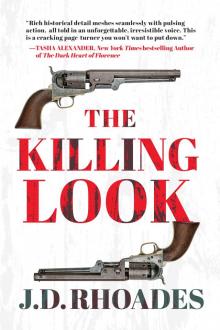 The Killing Look
The Killing Look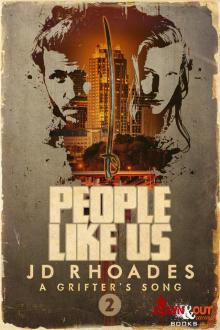 People Like Us
People Like Us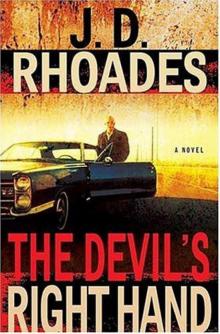 Jack Keller - 01 - The Devil's Right Hand
Jack Keller - 01 - The Devil's Right Hand Safe and Sound
Safe and Sound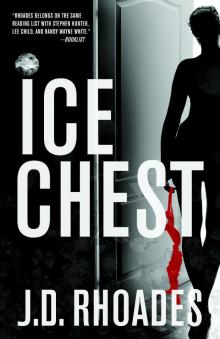 Ice Chest
Ice Chest Breaking Cover
Breaking Cover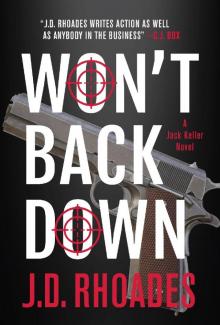 Won't Back Down
Won't Back Down Tony Wolf/Tim Buckthorn - 02 - Broken Shield
Tony Wolf/Tim Buckthorn - 02 - Broken Shield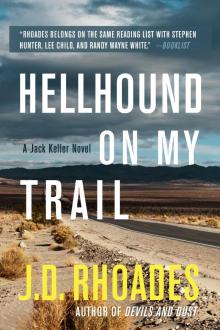 Hellhound On My Trail
Hellhound On My Trail Breaking Cover (Tony Wolf/Tim Buckthorn)
Breaking Cover (Tony Wolf/Tim Buckthorn)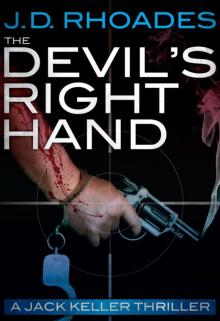 The Devil's Right Hand
The Devil's Right Hand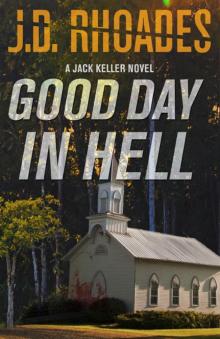 Good Day In Hell
Good Day In Hell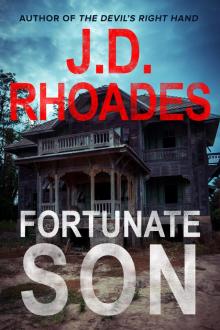 Fortunate Son
Fortunate Son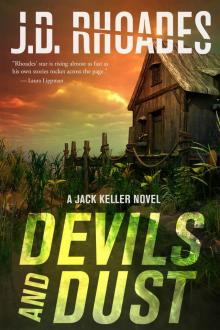 Devils and Dust
Devils and Dust